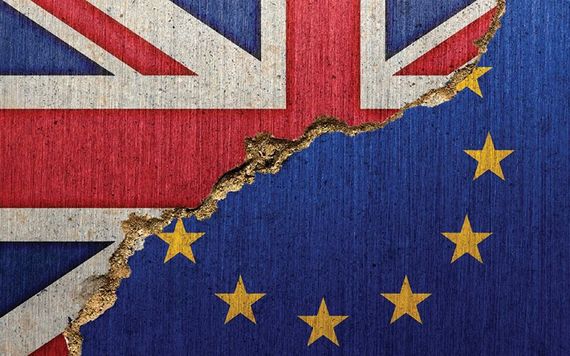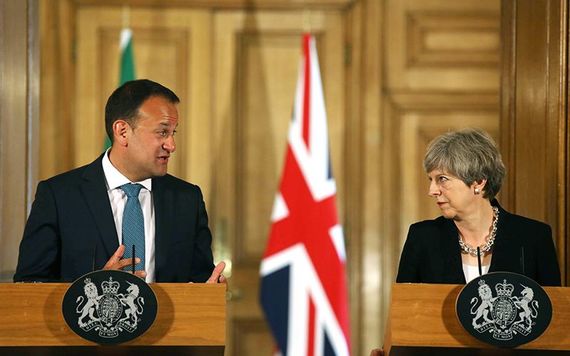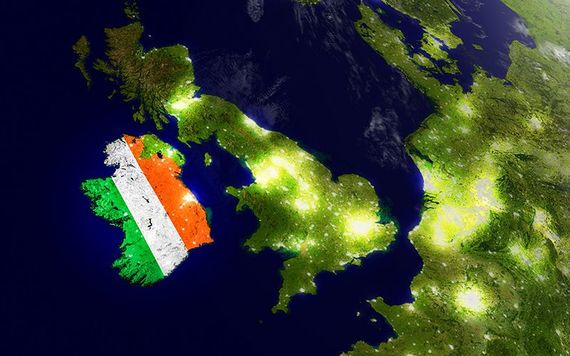Churchill is dead. The empire is lost. Dunkirk is all but a distant memory. But Brexit buffoonery feels like it will endure till the end of time.
Britain's true-blue Brexiters are still seriously suggesting that their fellow citizens will get through all the projected strife and chaos ahead—including food and medicine shortages, endless customs checks, possible riots and an entire cabinet of unexpected horrors—with just a stiff upper lip.
Chin up, old chap, we'll just jolly well muddle through they say, although they, like everyone else, have no idea what exactly they will be muddling through when it finally hits.
Want more coverage of Brexit? You can find our dedicated topic page here.

National strife looks a little less problematic if you're viewing it through the crenelated windows of your fifteen-century castle, like ERG member Jonathan Reese Mogg, presumably.
But if ever there was a time to puncture the delusional public school self-confidence around Brexit, it's now.
We can see through you all, I'm afraid. We have seen you quietly combing your family tree for any hint of an O'Shaughnessy or O'Malley in the mix in the hope of a backup burgundy passport.
If Brexit is so great, why the undignified rush to gain an Irish passport before B-Day, hah? Is there more to your sudden enthusiasm for dual citizenship than the desire to get through another Spanish airport at a clip?
Aren't you hedging your bets a little? It's a costly enterprise chasing after your grandparents birth, marriage and death certificates and that's before you pay the processing fee on the road to Irish citizenship.
Read more: Some Ulster unionists are now contemplating a United Ireland

So isn't a bit hypocritical to be battening down the hatches, turning the UK into a sour and unwelcoming fortress, harkening back to the ghosts of a long-lost Empire, and all the while discreetly paying for a get-out-of-jail-free EU passport option (if you can) as you move your investments offshore and stockpile cans of chickpeas and tinned tomatoes for the road ahead?
Whatever happened to Britain's famous poker face? These days we can easily see your hand in your face. In the North, for example, the Democratic Unionist Party (DUP) leader Arlene Foster can no longer conceal that she's risked the entire union on a bad bet.
And if you think the atmosphere between the EU and the Brexiteers is strained now, wait to see what it looks like after the UK crashes out after a no deal on March 29.

Prime Minister Theresa May knows this better than anyone and when push comes to shove at the end of the month she will have to consider pushing the ERG group and the DUP under the bus. And she will not hesitate to.
It's been fascinating to watch the DUP fail to grapple with the idea that they are no longer the one deciding voice in their own jurisdiction. They keep offering old deals to the EU that have already been rejected, stunned that nothing is working like it used to, and reduced to their core reflexes of saying no, glowering and then retreating from the discussion.
But Brexit isn't a discussion you can put on hold though, as the Irish government and the North's voters have reminded them since this lamentable farce first commenced. We might agree to a time-limited backstop Sammy Wilson sourly told the press this week. That's big of him, but that train left the station in 2016.
Read more: Irish politician bets on a United Ireland within 5 years

The North's voters have made it clear by a substantial majority that they want to remain in the EU and now, given a choice between a paranoid dysfunctional fortress and an open, outward-looking democracy, even voters within his own party have started contemplating the unthinkable.
It's the first principle of advertising, compare the good with bad. A united Ireland in Europe already looks better to a majority of the North's voters than a Brexit Britain. It's projected that there will not be a unionist majority in two years time, and a unionist voting minority by 2023. Do the math.
“I do wonder whether Brexit will prove to be the biggest own goal in 100 years from unionists,” said Mike Nesbitt, who stepped down as Ulster Unionist leader two years ago but remains an MLA, last week.

Mike Nesbitt
“I know there are a lot of people who feel they were diminished on 24 June 2016 by that result for Brexit and a lot of them believe that what happened there was that English nationalists came in over their heads and did exactly what the Agreement said couldn’t happen, denied them their sense of being European,” Nesbitt added.
“They feel diminished and the consequence is that the constitutional question is back on the table for the first time in 20 years. Where it leads, nobody knows.”
Well, by now we are starting to get a good indication, aren't we?
Want more coverage of Brexit? You can find our dedicated topic page here.




Comments